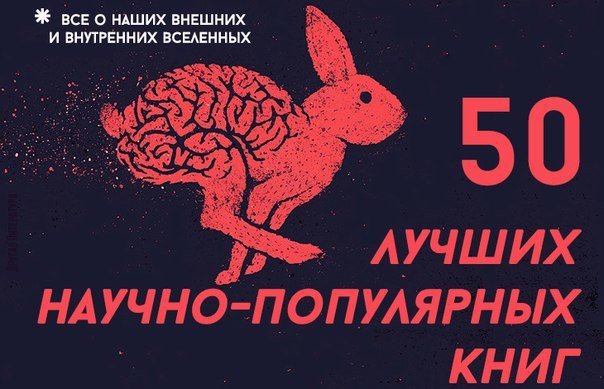50 best popular science books
It's no secret that in our pragmatic age popular science literature is becoming more and more popular, giving odds to the fiction of all stripes. For those who believe that it is never too late to learn, we have compiled a list of real pearls in the genre of science.
1. Eric Candel. In Search of Memory
2. Penny Lecuter, Jay Burrison. The buttons of Napoleon. Seventeen molecules that changed the world
3. Chris Frith. Brain and soul.
4. Jessica Snyder Sachs. Germs are good and bad. Our health and survival in the world
5. Arman Marie Leroy. Mutants
6. Nick Lane. Stairs of life. The Ten Greatest Inventions of Evolution
7. Ian Stewart. Truth and beauty. World History of Symmetry
8. Alex Vilenkin. The world of many worlds. Physicists in search of parallel universes
9. Neil Shubin. Inner fish. The history of the human body from the ancient times ...
10. John Derbyshire. A simple obsession. Bernhard Riemann and the greatest unsolved problem in mathematics
11. Sean Carroll. Adapt and survive! DNA as a record of evolution
12. Neil Shubin. The universe is within us. What do stones, planets, and people have in common?
13. Mangit Kumar. Quantum. Einstein, Bohr and the great debate about the nature of reality
14. Mark Changizi. The revolution in vision
15. Matt Ridley. Genome
16. Norman Doydge. Plasticity of the brain
17. Mitio Kaku. Future of the mind
18. N.P. Bekhtereva. The magic of the brain and the labyrinth of life
19. Richard Dawkins. A selfish gene
20. Stephen Hawking. Brief history of time. From the Big Bang to the Black Holes
21. Carl Sagan. A world full of demons. Science is like a candle in darkness.
22. What we believe, but we can not prove. Intellectuals of the XXI century about modern science
23. Richard F. Feynman. You're joking, of course, Mr. Feynman!
24. Stephen Hawking, Roger Penrose. The nature of space and time
25. Fritjof Capra. Tao of physics. Exploring the Parallels between Modern Physics and the Mysticism of the East
26. Mary Roach. Cadavr. How the body after death serves science
27. Shintan Yau, Steve Nadis. Theory of strings and hidden dimensions of the universe
28. Carl Zimmer. Evolution. Triumph of the idea
29. Oliver Sachs. Anthropologist on Mars
30. Asya Kazantseva. Who would have thought! How the brain makes us do stupid things
31. Leonard Mladinov. (Neo) conscious. How the unconscious mind governs our behavior
32. Albert Einstein. The world as I see it
33. Philip Ball. Critical mass. How do some phenomena give birth to others?
34. Bill Bryson. A Brief History of almost everything in the world
35. Jared Diamond. Guns, germs and steel. The fate of human societies
36. Irina Levontina. Russian with dictionary
37. Jack Kelly. Powder. From alchemy to artillery. The history of the substance that changed the world
38. Masha Hesse. Perfect severity. Grigory Perelman: genius and the task of the millennium
39. David Deutsch. The structure of reality. The Science of Parallel Universes
40. Steven Strogatz. The pleasure of x. A fascinating excursion into the world of mathematics from one of the best teachers in the world
41. Thomas Kuhn. Structure of scientific revolutions
42. Jim Baggott. Higgs boson. From the scientific idea to the "particle of God"
43. Paul Halpern. Collider
44. Richard Dawkins. Chaplain of the devil. Reflections on hope, lies, science and love
45. Lisa Randall. Knockin 'on Heaven. Scientific view on the device of the universe
46. Mitio Kaku. Hyperspace. A scientific odyssey through parallel worlds, holes in time and the tenth dimension
47. Stephen Hawking. My brief history
48. Jacob Perelman. Interesting algebra. Entertaining geometry
49. Stephen Hawking, R. Penrose, A. Shimoni, N. Cartwright. The big, small and human mind
50. George Johnson. The Ten Most Beautiful Experiments in the History of Science

Dawkins, Feynman, Hawking? Here comes upvote my dear. Good content.
Read and loved You're joking, of course, Mr. Feynman!
So I'm probably gonna give a try on a few of these.
Wonderful post